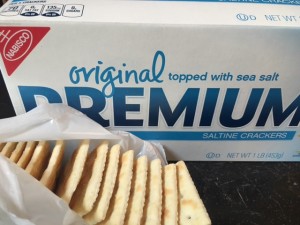In the last few weeks Phoenix has had several tragic deaths from hikers. Hiking in heat that is greater than 100 degrees F (37.7 Celsius for those of you who live in the civilized world). Often the news reports say they had plenty of water.
The deaths were attributed not to heat-stroke, but to water intoxication – or hyponatremia. That is – they died from low sodium in their bloodstream.
Our blood is made up of not water, but salt water. When we sweat we don’t sweat water, we sweat various salts and minerals. When people drink water, they dilute their blood chemistry. If it is diluted too much they can develop low-sodium which leads to confusion, dizziness, lethargy, seizures, and death.
Many state that sports drinks like Gatorade are inappropriate because they contain too much sugar and not enough salt. The math is simple: Gatorade contains about 450 milligrams of sodium per liter (Powerade contains 225 milligrams per liter). For hikers, they will sweat about 1-2 liters of fluid an hour with about 1000 milligrams of sodium, some more. Many people worry about the increased sugar in the drinks.
So what to do if you are a hiker?
This is the time when high salt foods are best. Those foods are kind of junk foods: saltine crackers contain 102 mg per cracker (so four crackers is about 1 liter of Gatorade). That is the same for an ounce of pretzels. A cup of regular chicken broth is about 860 mg. One half cup of tomato soup has over 640 mg of sodium.
Often hikers are health conscious and tend to eat a lot of fruits and vegetables that are low in sodium. Or they have “power bars” that have little sodium in them. Protein isn’t an issue until after the hike, sodium is an issue during the hike.
This is the one place where I say – think junk food and gatorade. Consider a can of soup before you go on your hike. Take pretzels, crackers, and the regular gatorade. Salt tablets and replacement packs are often not as high as a couple of saltine crackers, and cost a lot more.
That still may not protect you. Even a runner who pre-loaded with 6500 mg of sodium developed hyponatremia after a 17 hour hike. But the symptoms were recognized and he was treated appropriately allowing him to live. The runner did consume about 10 liters of water on the hike.
REFERENCES:
Am J Emerg Med. 1999 Oct;17(6):532-9. Exertional heat illness and hyponatremia in hikers.Backer HD, Shopes E, Collins SL, Barkan H.
Pearce EA, Myers TM, Hoffman MD.

